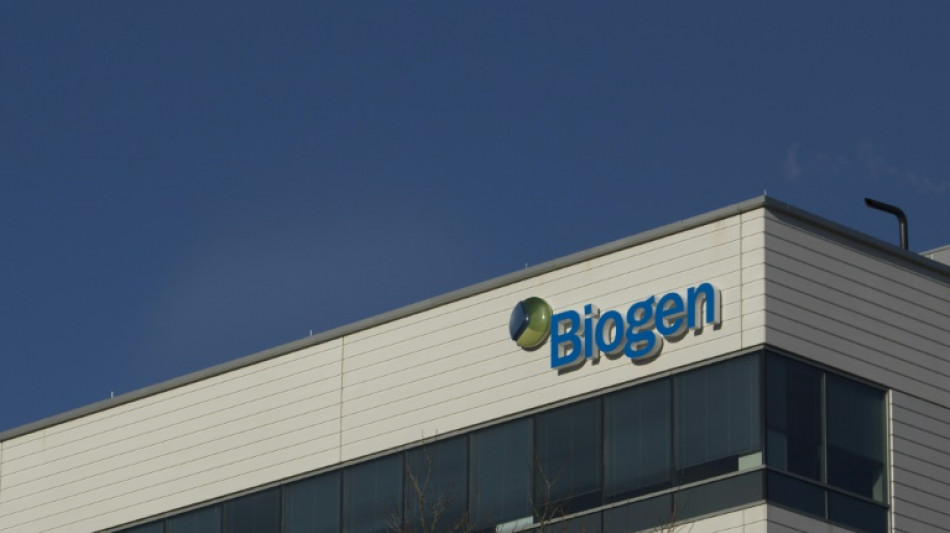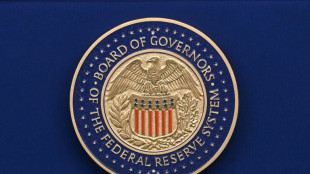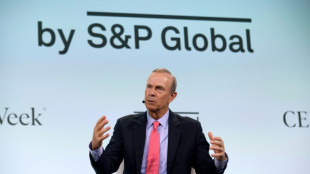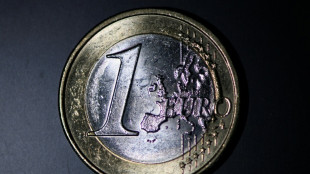
-
 Sinner boosts number one bid in Paris, to face Zverev in semis
Sinner boosts number one bid in Paris, to face Zverev in semis
-
Springer back in Toronto lineup as Blue Jays try to close out Dodgers

-
 Nationals make Butera MLB's youngest manager since 1972
Nationals make Butera MLB's youngest manager since 1972
-
Guirassy lifts Dortmund past Augsburg ahead of Man City clash

-
 G7 says it's 'serious' about confronting China's critical mineral dominance
G7 says it's 'serious' about confronting China's critical mineral dominance
-
NFL fines Ravens $100,000 over Jackson injury status report

-
 NBA refs to start using headsets on Saturday
NBA refs to start using headsets on Saturday
-
Trump says Christians in Nigeria face 'existential threat'

-
 French-Turkish actor Tcheky Karyo dies at 72
French-Turkish actor Tcheky Karyo dies at 72
-
Food stamps, the bulwark against hunger for over 40 mn Americans

-
 Trump keeps world guessing with shock nuclear test order
Trump keeps world guessing with shock nuclear test order
-
Wall Street stocks rebound on Amazon, Apple earnings

-
 US Fed official backed rate pause because inflation 'too high'
US Fed official backed rate pause because inflation 'too high'
-
Prayers and anthems: welcome to the Trump-era Kennedy Center

-
 Swiss central bank profits boosted by gold price surge
Swiss central bank profits boosted by gold price surge
-
Sinner beats Shelton to boost number one bid in Paris

-
 French court jails Bulgarians for up to four years for Holocaust memorial defacement
French court jails Bulgarians for up to four years for Holocaust memorial defacement
-
Profits dip at ExxonMobil, Chevron on lower crude prices

-
 Ashraf and Mirza skittle South Africa as Pakistan win 2nd T20
Ashraf and Mirza skittle South Africa as Pakistan win 2nd T20
-
2,000 trucks stuck in Belarus after Lithuania closes border: association

-
 French lawmakers reject wealth tax proposal in budget debate
French lawmakers reject wealth tax proposal in budget debate
-
Premier League blames European expansion for lack of Boxing Day games

-
 Bublik sets up Auger-Aliassime semi-final at Paris Masters
Bublik sets up Auger-Aliassime semi-final at Paris Masters
-
World's most expensive coffee goes on sale in Dubai at $1,000 a cup

-
 Trump stirs global tensions, confusion with nuclear test order
Trump stirs global tensions, confusion with nuclear test order
-
Panic across US as health insurance costs set to surge

-
 Court eases ban on Russian lugers but Olympic hopes on thin ice
Court eases ban on Russian lugers but Olympic hopes on thin ice
-
England captain Itoje targets Autumn Nations clean sweep

-
 Calmer Sabalenka sets sights on WTA Finals crown
Calmer Sabalenka sets sights on WTA Finals crown
-
Spurs boosted by Romero return for Chelsea clash

-
 Sudan's RSF claims arrests as UN warns of 'horrendous' atrocities in Darfur
Sudan's RSF claims arrests as UN warns of 'horrendous' atrocities in Darfur
-
US says 'non-market' tactics needed to counter China's rare earth dominance

-
 China sends youngest astronaut, mice to space station
China sends youngest astronaut, mice to space station
-
From adored prince to outcast, Andrew's years-long fall from grace

-
 Rodri return fuels Guardiola belief in Man City title challenge
Rodri return fuels Guardiola belief in Man City title challenge
-
China holds send-off ceremony for space station astronauts

-
 Barcelona to show off unfinished Camp Nou with public training session
Barcelona to show off unfinished Camp Nou with public training session
-
Turkish court jails 11 for life over deadly hotel inferno

-
 Auger-Aliassime ends Vacherot run to reach Paris Masters semis
Auger-Aliassime ends Vacherot run to reach Paris Masters semis
-
Australia captain Wilson denies Wallabies use 'dangerous' breakdown tactics

-
 'Populists can be beaten': Dutch centrist Jetten claims election win
'Populists can be beaten': Dutch centrist Jetten claims election win
-
China's suspension of rare earth controls applies to EU: official

-
 Italy complains about strong euro, urges ECB to cut rates
Italy complains about strong euro, urges ECB to cut rates
-
Louvre to get anti-ramming barriers by year end: minister

-
 Wall Street bounces on Amazon, Apple earnings
Wall Street bounces on Amazon, Apple earnings
-
AI giants turn to massive debt to finance tech race

-
 Japan PM says raised 'serious concerns' with Xi on South China Sea, Xinjiang
Japan PM says raised 'serious concerns' with Xi on South China Sea, Xinjiang
-
Shein set to open first physical store in Paris

-
 Turkish court jails 11 for life over deadly hotel fire
Turkish court jails 11 for life over deadly hotel fire
-
Hazlewood stars as Australia ease past India to win 2nd T20


European watchdog partially approves new Alzheimer's drug
Europe's medicines watchdog on Thursday partially approved a marketing request for a long-awaited new treatment for Alzheimer's disease, reversing an earlier decision not to give it the green light.
"After re-examining its initial opinion, the EMA... has recommended granting marketing authorisation to Leqembi (lecanemab) for treating mild cognitive impairment or mild dementia due to Alzheimer's disease," the European Medicines Agency said, adding treatment would only apply to a certain group of patients.
Leqembi, developed by US multinational Biogen and Japanese-based Eisai, is the brand name of an active substance called lecanemab that is used to treat adults with mild memory and cognitive problems resulting from the early stages of the common type of dementia.
The EMA in July rejected a marketing request, saying the side effects, including potential brain bleeding, outweighed the benefits.
The EMA now endorsed the treatment, but only for patients with a lower risk of potential brain bleeding -- those who had "only one copy or no copy of ApoE4", a type of gene know as an important risk factor for Alzheimer's.
Such patients are less likely to experience certain serious health problems than people with two copies of the gene, the Amsterdam-based EMA said.
The health problems in question, known as amyloid-related imaging abnormalities (ARIA), include fluid on the brain and brain bleeding.
"The benefits of Leqembi outweigh the risks in patients with mild cognitive impairment or mild dementia due to Alzheimer's disease with one or no copy of ApoE4."
This was "provided that risk minimisation measures are in place to reduce the risk of severe and symptomatic ARIA and monitor its consequences in the long term," it stressed.
Bringing down the risks included providing Leqembi through a "controlled access programme to ensure that the medicine is only used in the recommended patient population" and through MRI scans before and during treatment.
The Amsterdam-based EMA's approval will now be sent to the European Commission for a final decision to roll it out on the continent.
Pricing and reimbursement will be left up to member states, the EMA said.
Lecanemab has been hailed by Alzheimer's researchers and charities for being the first approved treatment which tackles the early stages of the disease, rather than managing the symptoms.
It works by using antibodies which bind to and clear the proteins that normally build up in the brains of people with Alzheimer's, the most common type of dementia.
The treatment has been shown to decrease cognitive decline by a quarter in people in the early stages of the disease.
Britiain's medicines regulator approved lecanemab in August, making it the country's first such licensed treatment.
Leqembi, together with another Alzheimer's drug called Aduhelm, received approval from the US Food and Drug Administration early last year.
L.Stucki--VB



